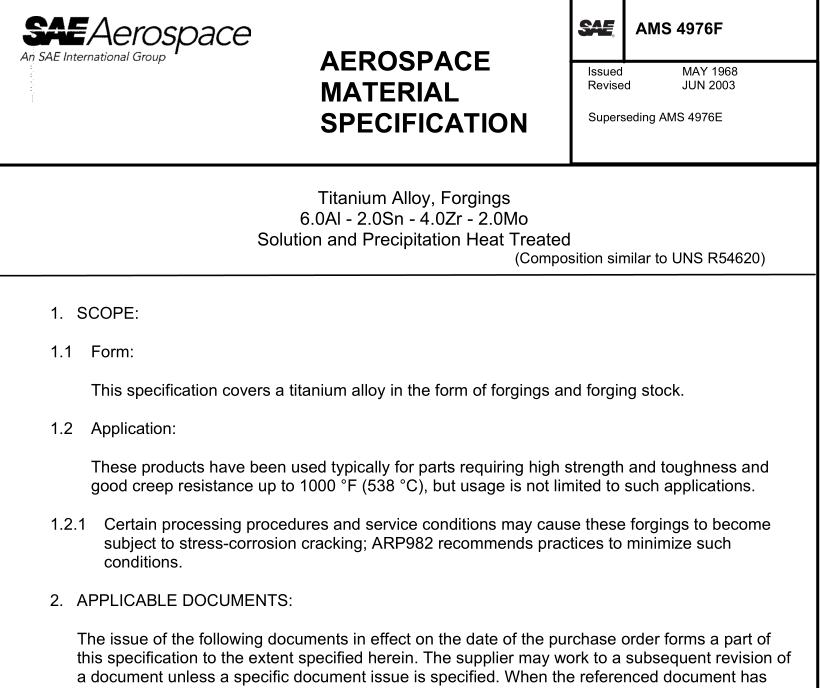SAE AMS 4976F:2003 pdf download Titanium Alloy, Forgings 6.0Al – 2.0Sn – 4.0Zr – 2.0Mo Solution and Precipitation Heat Treated
1. SCOPE:
1.1 Form: This specification covers a titanium alloy in the form of forgings and forging stock.
1.2 Application: These products have been used typically for parts requiring high strength and toughness and good creep resistance up to 1000 °F (538 °C), but usage is not limited to such applications.
1.2.1 Certain processing procedures and service conditions may cause these forgings to become subject to stress-corrosion cracking; ARP982 recommends practices to minimize such conditions.
2. APPLICABLE DOCUMENTS: The issue of the following documents in effect on the date of the purchase order forms a part of this specification to the extent specified herein. The supplier may work to a subsequent revision of a document unless a specific document issue is specified. When the referenced document has been cancelled and no superseding document has been specified, the last published issue of that document shall apply.
2.1 SAE Publications:
Available from SAE, 400 Commonwealth Drive, Warrendale, PA 15096-0001 or www.sae.org.
AMS 2249 Chemical Check Analysis Limits, Titanium and Titanium Alloys
AMS 2750 Pyrometry
AMS 2808 Identification, Forgings
ARP982 Minimizing Stress-Corrosion Cracking in Wrought Titanium Alloy Products
2.2 ASTM Publications:
Available from ASTM, 100 Barr Harbor Drive, West Conshohocken, PA 19428-2959 or
www.astm.org.
ASTM E 8 Tension Testing of Metallic Materials
ASTM E 8M Tension Testing of Metallic Materials, Metric
ASTM E 21 Elevated Temperature Tension Tests of Metallic Materials
ASTM E 120 Chemical Analysis of Titanium and Titanium Alloys
ASTM E 139 Conducting Creep, Creep-Rupture, and Stress-Rupture Tests of Metallic Materials
ASTM E 292 Conducting Time-for-Rupture Notch Tension Tests of Materials
ASTM E 1409 Determination of Oxygen in Titanium and Titanium Alloys by the Inert Gas Fusion Technique
ASTM E 1447 Determination of Hydrogen in Titanium and Titanium Alloys by the Inert Gas Fusion Thermal Conductivity Method
3. TECHNICAL REQUIREMENTS:
3.1 Composition:
Shall conform to the percentages by weight shown in Table 1; oxygen shall be determined in accordance with ASTM E 1409, hydrogen in accordance with ASTM E 1447, and other elements by wet chemical methods in accordance with ASTM E 120, by spectrochemical methods, or by other analytical methods acceptable to purchaser.
3.1.1 Hydrogen content of forgings may be as high as 0.0150 (150 ppm).
3.1.1.1 When using ASTM E 1447 for hydrogen determination, sample size may be as large as 0.35 gram.
3.1.2 Determination not required for routine acceptance.
3.1.3 Check Analysis: Composition variations shall meet the applicable requirements of AMS 2249;no variation over maximum will be permitted for yttrium.
3.2 Melting Practice:
SAE AMS 4976F:2003 pdf download
